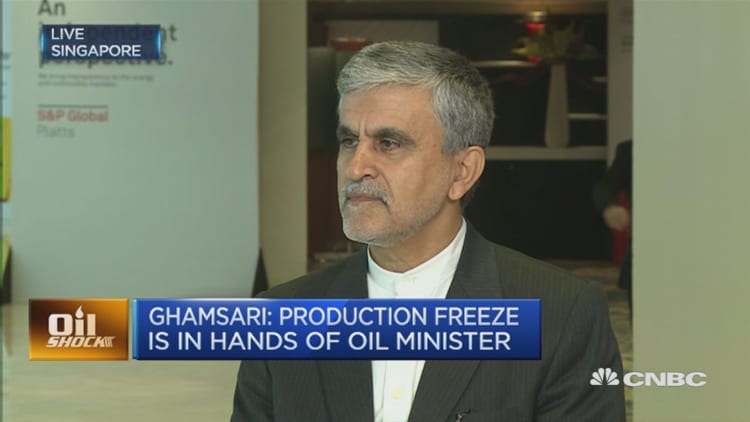




Major oil producer Iran has said it will increase its own oil output to pre-sanctions levels in the next few months, shrugging off the deal between Russia and Saudi Arabia to stabilize oil markets.
The National Iranian Oil Company's (NIOC) director for international affairs told CNBC on Wednesday that Iran's oil output had reached 3.8 million barrels per day and that it would increase production.
"Our current rate of production is slightly over 3.8 million barrels per day and before sanctions we were over 4 million," said NIOC's Seyed Mohsen Ghamsari, who was speaking at a petroleum conference in Singapore hosted by S&P Global Platts.
"And as everyone knows in the market, we are soon going to introduce new crude oil to the market by the end of the year, (that means increasing output) by at least 300,000 barrels a day so it means that we can match (our pre-sanction) production in two or three months,"
Dismissing concerns that an oversupply of oil could dampen a price recovery and delicate rebalancing in oil markets, Dow Jones reported on Wednesday that Ghamsari had said that the oil market would be rebalancing by the fourth quarter of this year or the start of 2017.
The comments come after other major oil producers Russia and Saudi Arabia (an OPEC member alongside Iran) announced on Monday that they would form a strategic energy partnership designed to help stabilize oil markets.
Although no formal agreement was mentioned on freezing production levels, a move that could help to support global oil prices which slumped on an glut in supply, the agreement was seen as "meaningful" by analysts as it marked a further step towards putting a floor under oil prices.
Since sanctions were lifted on Iran, a member of the 14 member producers group OPEC, the country has been keen to get its oil industry up and running as quickly as possible, despite the glut and calls from other OPEC members to curb output as they struggle with lower oil export revenues.
Iran is not at all keen on curbing output, however, and has so-far ruled out any production freeze, putting it at odds with the rest of the group. Tensions between Iran and Saudi Arabia are already running high on a geopolitical level too.
Ghamsari told CNBC that and decision to freeze output was in the hands of the country's oil minister, Bijan Namdar Zangeneh.
"He has to decide. But based on his previous announcements, as soon as we can come back to the previous production (levels) before sanctions, we can think about that and discuss. Now we are almost close to that production level."
Now, all eyes are on the forthcoming informal meeting of OPEC in Algeria later this month but analysts are skeptical over whether the Saudi-Russia pact will have any bearing on the group as a whole.
Seth Kleinman, the head of European energy research at Citigroup, told CNBC on Wednesday that the agreement had limited substance but worked to support the oil price, which was buoyed by the news. On Wednesday, Brent futures were trading at $47.73 a barrel and WTI crude at $45.21.
"I'm going to join the rest of the market in remaining extremely skeptical that we're going to see anything actually change, such as barrels taken off the market as a result of the Algiers meeting. This (Russia-Saudi) agreement is totally devoid of details," he told CNBC on the sidelines of the Singapore conference.
"It's not a coincidence that both countries are producing at the moment so a freeze wouldn't be that big a stretch but I'd say that, given how well the oil price responds to any rumor or murmur of a looming agreement, why not go ahead and have another meeting? It works very well."



